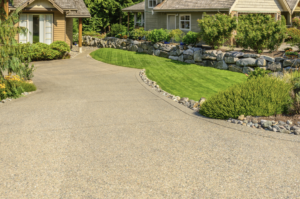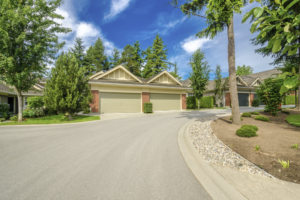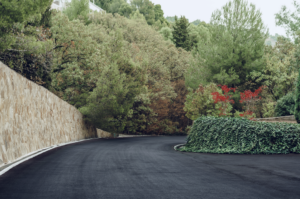When it comes to paving a driveway that lasts, one detail makes or breaks the job: driveway grading. It’s not flashy, but it’s fundamental. The slope beneath your surface quietly determines whether your driveway handles water or lets it wreak havoc.
What is driveway grading?
Driveway grading is the process of sculpting the ground before laying asphalt or any other surface. The goal is straightforward: to create a consistent slope that directs water away from your driveway and home. Without this crucial step, water pools and cracks form, and over time, you’re stuck footing the bill for a full replacement.
Grading shapes more than the look of your driveway. It sets the stage for durability, longevity, and a sense of peace of mind. When done correctly, grading prevents premature damage, promotes even wear, and protects the surrounding landscape and foundation from water-related issues that could escalate quickly.
How do you grade a driveway for drainage?
It starts with a plan. A professional evaluates the natural contours of your property to determine the ideal slope. That slope typically needs to be at least two percent, which means about a quarter inch of drop for every foot of the driveway. While the change may be subtle to the eye, it’s powerful in keeping water in motion.
Once the layout is determined, excavation begins. The topsoil is removed, and the subgrade is compacted to create a stable foundation. This step is critical because uneven or loosely packed soil will eventually settle, forming low spots where water collects. After compaction, a base layer of crushed stone or gravel is added and shaped to match the desired slope.
At this point, precision is everything. Heavy equipment is used to fine-tune the grade, following the layout developed during the planning phase. Once the surface is ready, the final layer of material is applied, following the grade exactly. In some designs, the center of the driveway is built slightly higher than the edges (a crowned profile) to encourage runoff. In others, the whole surface might tilt gently toward one side.
It’s not just about moving the earth. It’s about engineering a surface that channels water effectively without compromising structure. That’s why experienced teams like Walt’s Paving are trusted to get it right the first time.
Do you need drainage on a driveway?
The answer is always yes. Whether you’re dealing with spring rain, melting snow, or a neighbor’s sprinkler overspray, water will inevitably find its way to your driveway. If it has nowhere to go, it begins to pool and seep beneath the surface. Over time, that water erodes the base, softens the foundation, and leads to surface cracks and potholes.
And the damage doesn’t stop there. Without proper drainage, water can affect nearby landscaping, sidewalks, and even the home’s foundation. It can wash away soil and create icy spots in the winter that pose a serious safety hazard.
That’s why every properly installed driveway includes a drainage strategy. On sloped properties, water may run off efficiently. But on flatter land or soil that doesn’t absorb moisture quickly, additional solutions are often needed. This can include trench drains, French drains, or side channels that guide water to safe discharge areas. Drainage isn’t just a nice feature. It’s an essential part of a driveway system that protects your property and saves you from costly repairs in the future.
The Best Drainage System for a Driveway
The ideal drainage system depends on your property’s slope, soil, climate, and driveway surface. Still, there are a few solutions that consistently deliver excellent results. A crowned driveway is one of the most common. The center is built slightly higher than the edges, allowing water to naturally roll off both sides. This method is simple and effective, especially for gravel and asphalt driveways on open land.
Trench drains are another excellent option, particularly near garage doors or at the base of a sloped driveway. These narrow channels run across the width of the driveway and collect surface water before it can reach structures or pools in low areas. They work well for properties where the driveway tilts toward the home or a retaining wall.
For areas with persistent moisture issues, French drains are an innovative solution. These systems use perforated pipes buried in gravel to catch water underground and redirect it to a safe outlet. French drains are typically covered by soil or decorative gravel, so they remain out of sight while they work behind the scenes.
In some cases, a combination of systems is the most effective approach. A driveway might feature a crowned profile with a trench drain near the bottom and a French drain at the edge of the property. The key is understanding how water behaves on the site and building a system that directs it safely away. At Walt’s Paving, we consider every factor before recommending a solution. Our goal is to design a grading and drainage plan that works with your property, not against it.
Why Grading Is a Long-Term Investment
Grading doesn’t receive the same attention as asphalt or sealcoating, but it’s the reason your driveway performs well year after year. When done correctly, grading ensures water moves away instead of soaking in. It reduces maintenance costs, improves safety, and extends the life of your investment.
Without proper grading, driveways tend to wear out more quickly. Water gets trapped, and freezing and thawing cycles expand cracks, leading to frequent and expensive repairs. But when the ground is adequately graded and paired with the proper drainage system, your driveway holds strong and looks great for years to come.
Homeowners who invest in grading aren’t just paying for dirt work. They’re investing in a smart foundation that adds value, curb appeal, and structural integrity. It’s the kind of proactive thinking that keeps minor problems from becoming big ones.
Built to Perform with Walt’s Paving
Every great driveway begins with one question: Where does the water go? Answering that question correctly sets the tone for everything that follows. From the first scoop of earth to the final layer of asphalt, the team at Walt’s Paving brings the tools, the knowledge, and the commitment to build driveways that last.
If you’re planning a new driveway or replacing an old one, don’t settle for surface-level solutions. Let the experts handle the grade, guide the water, and pave the way for a trouble-free future. Contact Walt’s Paving today and discover the difference that experience, craftsmanship, and care can make for your home.
How can Walt’s Paving help?
You can count on Walt’s Paving to complete your residential or commercial paving project efficiently and in a timely manner. We have over 40 years of experience paving asphalt driveways, making asphalt repairs, and sealcoating asphalt. We are located in Osceola, IN, and service homeowners and businesses within 50 miles of Elkhart, IN. Call us today.







